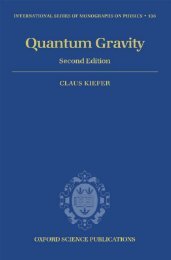Three Roads To Quantum Gravity
Three Roads To Quantum Gravity
Three Roads To Quantum Gravity
You also want an ePaper? Increase the reach of your titles
YUMPU automatically turns print PDFs into web optimized ePapers that Google loves.
52 THREE ROADS TO QUANTUM GRAVITY<br />
images themselves that are the illusion. The world is never<br />
still ± it is always in motion. The illusion that photography<br />
creates is of a frozen moment of time. It corresponds to<br />
nothing in reality, nor is it itself real, for any photograph is<br />
also a process. In a few years it will fade as a result of<br />
chemical processes which are always going on between the<br />
molecules that make up the apparently still image. So what<br />
happens in a movie is that the real world of motion and<br />
change is recreated from a sequence of illusions, not the<br />
reverse.<br />
We humans seem to be fascinated by our ability to hold<br />
back change for long periods of time. This may be why<br />
painting and sculpture are so fascinating and so valuable, for<br />
they offer the illusion of time stopped. But time cannot be<br />
stopped. A marble sculpture may look the same from day<br />
to day, but it is not: each day the surface becomes a little<br />
different as the marble interacts with the air. As the Florentines<br />
have learned only too well from the damage wrought<br />
to their heritage by pollution, marble is not an inert thing, it is<br />
a process. All the skill of the artist cannot turn a process into a<br />
thing, for there are no things, only processes that appear to<br />
change slowly on our human timescales. Even objects that<br />
seem not to change, like rocks and can openers, have stories.<br />
It is just that the timescale over which they change signi®cantly<br />
is longer than for most other things. Geologists and<br />
cultural historians are very interested in narrating the stories<br />
of rocks and can openers.<br />
So there are not really two categories of things in the world:<br />
objects and processes. There are only relatively fast processes<br />
and relatively slow processes. And whether it is a short story<br />
or a long story, the only kind of explanation of a process that<br />
is truly adequate is a story.<br />
The illusion that the world consists of objects is behind many<br />
of the constructs of classical science. Supposing one wants to<br />
describe a particular elementary particle, say a proton. In the<br />
Newtonian mode of description one would describe what it is<br />
at a particular moment of time: where it is located in space,<br />
what its mass and electric charge are, and so forth. This is<br />
called describing the `state' of the particle. Time is nowhere in


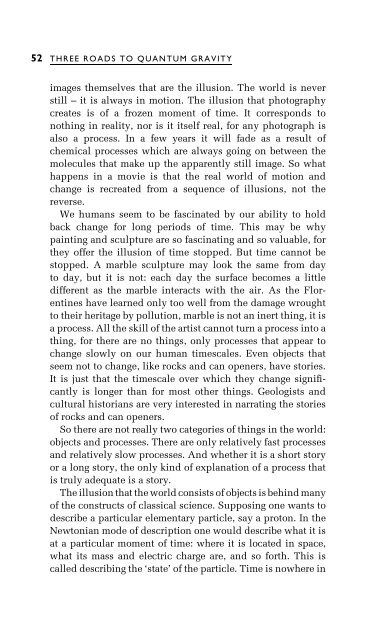
![arXiv:1001.0993v1 [hep-ph] 6 Jan 2010](https://img.yumpu.com/51282177/1/190x245/arxiv10010993v1-hep-ph-6-jan-2010.jpg?quality=85)

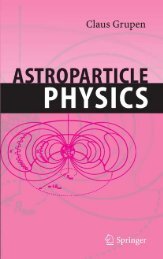
![arXiv:1008.3907v2 [astro-ph.CO] 1 Nov 2011](https://img.yumpu.com/48909562/1/190x245/arxiv10083907v2-astro-phco-1-nov-2011.jpg?quality=85)
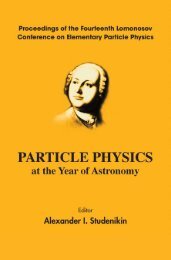
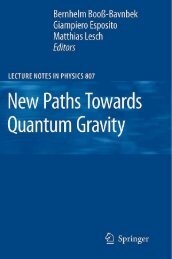
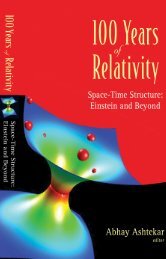
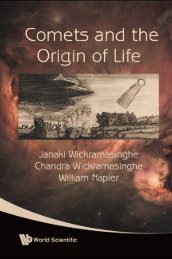
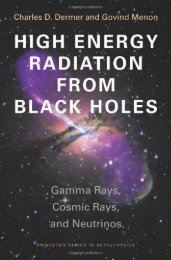
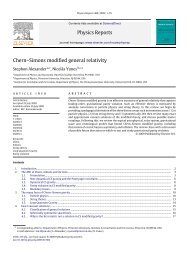
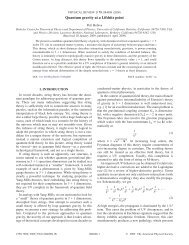

![arXiv:1002.4928v1 [gr-qc] 26 Feb 2010](https://img.yumpu.com/41209516/1/190x245/arxiv10024928v1-gr-qc-26-feb-2010.jpg?quality=85)
![arXiv:1206.2653v1 [astro-ph.CO] 12 Jun 2012](https://img.yumpu.com/39510078/1/190x245/arxiv12062653v1-astro-phco-12-jun-2012.jpg?quality=85)
